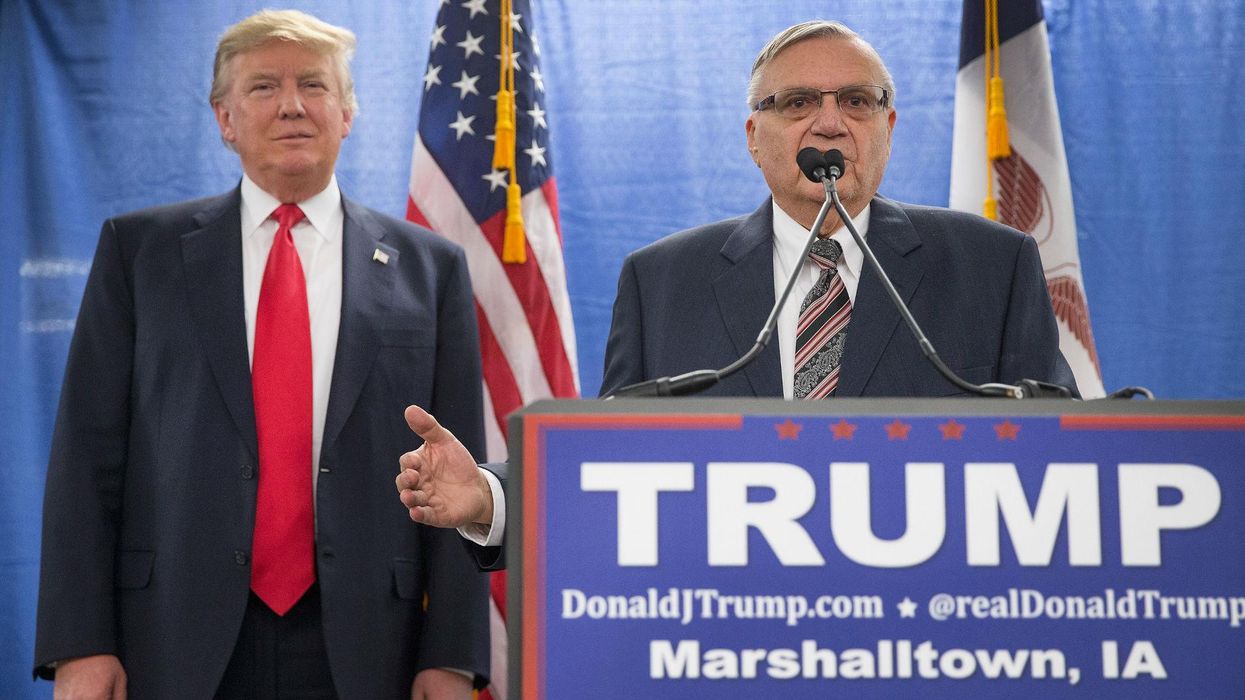News
Joe Vesey-Byrne
Aug 27, 2017

Picture:
Scott Olson/Getty Images
On Saturday President Donald Trump pardoned Sheriff Joe Arpaio of Arizona, the cop convicted of defying a court order to end a policy of racial profiling in Arizona.
Arpaio, aged 85, was found guilty in July of criminal contempt.
During his tenure as Sheriff of Maricopa County, which ended in 2016 after 24 years of service, Arpaio was accused of defying a court order to stop traffic police from targeting Latino drivers.
A disproportionate number were found to have been targeted, so that they could be arrested and held on minor traffic offences, allowing police officers to find out if they were an illegal immigrant, and then turn them over to immigration officials.
The practise began as a 'three-week trial', conducted in 2007. At the time the American Civil Liberties Union issued a court injunction in an effort to stop the practise.
A 2011 court order to stop the practise was also issued by a federal court, but it was found to have continued. Lawyers for Arpaio told CNN that the order was unclear, and blamed his previous lawyers for allegedly miscommunicating the court order.
Prosecutors in the 2017 trial asserted Arpaio's non-compliance with the order had been deliberate.
'Racial profiling' in law enforcement is illegal, and forbidden under the US Bill of Rights.
Arpaio was due to be sentenced in October 2017, with a possible penalty for six months in prison.
'Sheriff Joe' and the 'law-and-order candidate'
In the US, some law enforcement positions such as sheriff are elected. Arpaio, a Republican, was unseated by Democrat Paul Penzone.
The case of Arpaio came with a further political dimension, as the sheriff had appeared at rallies held by President Trump during the 2016 election.
Arpaio, referred to as 'Sheriff Joe' repeatedly endorsed then contender Trump as the 'law-and-order' candidate.
Presidential pardoning
President Trump issued his first pardon on the evening of 26 August for Arpaio.
The 'benign prerogative' as it is also known, is intended to give the President, as an elected official, a chance to intervene in cases of public interest.
It is all a part of the US system which seeks to prevent any one of the three branches of government - executive, legislative, judicial, from becoming more powerful than the other two.
In the case of Arpaio, his pardoning will be considered to be less than 'benign', and more like cronyism.
In a statement defending the pardon, President Trump said:
Sheriff Joe Arpaio is now 85 years old, and after more than 50 years of admirable service to our nation, he is a worthy candidate for a presidential pardon...
Throughout his time as sheriff, Arpaio continued his life’s work of protecting the public from the scourges of crime and illegal immigration,
The decision has been criticised by groups such as the American Civil Liberties Union, whose campaign for a court injunction led to the 2011 ruling to stop the profiling of Latinos.
Following the pardoning announcement the ACLU tweeted:
With his pardon of Arpaio, President Trump has chosen lawlessness over justice, division over unity, hurt over healing.
In a tweet that followed shortly after, the ACLU linked the pardon to accusations that President Trump has humoured the 'white nationalist' movement.
'I'm not going away'
In an interview with Reuters, Arpaio thanked the President for the pardon.
I have to thank the president for what he has done, that’s for sure...
He’s a big supporter of law enforcement.
Although Arpaio declined to say if he wound run again, in an attempt to win back the office of Sheriff in the election scheduled for 2020, he did say:
I’m not going away,
He claims he plans to reveal more details of the case and his side of the story on Monday.
More: This video of police pulling over a state attorney makes an important point about race
Top 100
The Conversation (0)













